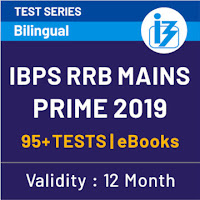IBPS RRB PO/Clerk Main Banking Awareness Quiz
Q1. निम्नलिखित में से किस सहकारी बैंक को भारत में पहला सहकारी बैंक माना जाता है?
(a) अमानाथ सहकारी बैंक लिमिटेड
(b) अन्योनय को-ऑपरेटिव बैंक
(c) ग्रेटर बॉम्बे को-ऑपरेटिव बैंक लिमिटेड
(d) अभ्युदय को-ऑपरेटिव बैंक लिमिटेड
(e) दिए गए विकल्पों में से कोई भी सत्य नहीं है
Q2. भारत में पहली सहकारी क्रेडिट सोसायटी की शुरुआत किस वर्ष में की गई थी?
(a) 1929
(b) 1950
(c) 1904
(d) 1980
(e) 1975
Q3. भारत में सहकारी बैंक निम्न में से किसमें पंजीकृत हैं-
(i) बैंकिंग कानून (सहकारी समितियाँ) अधिनियम, 1965
(ii) बैंकिंग विनियमन अधिनियम, 1949
(iii) कंपनी अधिनियम, 1956
(a) केवल (i)
(b) (i) और (ii)
(c) (ii) और (iii)
(d) (i), (ii) और (iii)
(e) दिए गए विकल्पों में से कोई भी सत्य नहीं है
Q4. सरया समिति के अनुसार, समाज की औसत सदस्यता ______ है।
(a) 19
(b) 48
(c) 25
(d) 32
(e) 45
Q5. आर्थिक नीति की एक शाखा के रूप में मौद्रिक नीति _______ द्वारा प्रशासित की जाती है।
(a) भारत के प्रधान मंत्री
(b) भारत सरकार
(c) भारतीय स्टेट बैंक
(d) भारतीय रिजर्व बैंक
(e) सेबी
Q6. कौन सा संगठन पुनर्वित्त सहायता प्रदान करता है और राज्य सहकारी बैंकों और केंद्रीय सहकारी बैंकों के निरीक्षण का ध्यान रखता है?
(a) नाबार्ड
(b) आरबीआई
(c) एसबीआई
(d) केंद्र सरकार
(e) राज्य सरकार
Q7. भारत में को-ऑपरेटिव बैंक ग्रामीण क्षेत्रों को _______ के तहत वित्त नहीं देते हैं।
(a) व्यक्तिगत वित्त
(b) बड़े व्यवसाय के लिए दीर्घकालिक ऋण
(c) खेती
(d) मवेशी
(e) दिए गए विकल्पों में से कोई भी सत्य नहीं है
Q8. भारत में को-ऑपरेटिव बैंक की________ है।
(a) चार स्तरीय प्रणाली
(b) दो स्तरीय प्रणाली
(c) तीन स्तरीय प्रणाली
(d) पांच स्तरीय प्रणाली
(e) छह स्तरीय प्रणाली
Q9. निम्नलिखित में से कौन सा कथन नेशनल फेडरेशन ऑफ स्टेट को-ऑपरेटिव बैंक्स (NAFSCOB) के बारे में सही है?
(a) सदस्य बैंकों को अनुसंधान और परामर्श इनपुट प्रदान करता है
(b) सदस्य बैंकों के हितों को बढ़ावा देता है और उनकी रक्षा करता है
(c) सदस्य बैंकों को एक समान मंच प्रदान करता है
(d) उपरोक्त सभी
(e) दिए गए विकल्पों में से कोई भी सत्य नहीं है
Q10. राज्य सहकारी बैंक, राज्य स्तर पर शीर्ष बैंक होते हैं, जो ______।
(a) एक तरफ आरबीआई और मुद्रा बाजार के बीच लिंक प्रदान करता है, और दूसरी ओर संपूर्ण सहकारी क्रेडिट संरचना प्रदान करता है
(b) अधिशेष संसाधनों और केंद्रीय सहकारी बैंकों के भंडार के संरक्षक के रूप में कार्य करता है और उन्हें भारी जमा को आकर्षित करने और RBI से ऋण प्राप्त करके पूरक करता है।
(c) पूरे राज्य में संसाधनों की आवाजाही के लिए संतुलन केंद्र के रूप में कार्य करता है
(d) उपरोक्त सभी
(e) दिए गए विकल्पों में से कोई भी सत्य नहीं है
Q11. RBI को अंतिम पुनर्स्थापना (last restore) के ऋणदाता के रूप में जाना जाता है, क्योंकि-
(a) इसके लिए उन नागरिकों को ऋण की जरूरत को पूरा करना होगा जिनके लिए कोई और ऋण देने को तैयार नहीं है
(b) बैंक अंतिम पुनर्स्थापना(last restore) के रूप में RBI तक जाने के लिए ऋण देते हैं
(c) संकट के समय बैंकों की सहायता करता है
(d) उपरोक्त सभी
(e) दिए गए विकल्पों में से कोई भी सत्य नहीं है
Q12. भारतीय महिला बैंक की आधारभूत पूँजी कितनी थी?
(a) 5000 करोड़ रु
(b) 1000 करोड़ रु
(c) 500 करोड़ रु
(d) 100 करोड़ रु
(e) 700 करोड़ रु
Q13. निम्न में से कौन सा RBI की शक्तियों के संबंध में गलत है?
(a) RBI भारत का सर्वोच्च मौद्रिक प्राधिकरण है
(b) RBI विदेशी रिजर्व के संरक्षक के रूप में काम करता है
(c) भारतीय अर्थव्यवस्था में मुद्रा नोटों की छपाई और धन की आपूर्ति के प्रबंधन के लिए RBI जिम्मेदार है।
(d) RBI हर साल केंद्रीय बजट प्रस्तुत करता है
(e) दिए गए विकल्पों में से कोई भी सत्य नहीं है
Q14. निम्नलिखित में से कौन एक निवेश सलाहकार अनुशासन है?
(a) कॉर्पोरेट औद्योगिक वित्त
(b) विदेश स्थित (Offshore ) बैंकिंग
(c) थोक बैंकिंग (Wholesale Banking)
(d) वेल्थ मैनेजमेंट
(e) व्यापार वित्त
Q15. जब बैंक एक निश्चित अवधि के लिए किसी व्यक्ति से निश्चित धनराशि स्वीकार करते हैं और ब्याज के साथ परिपक्वता पर भुगतान करते हैं, तो जमा राशि को ___के रूप में जाना जाता है?
(a) सावधि जमा
(b) डिमांड डिपॉजिट
(c) बॉन्ड
(d) बंधक (Mortgage)
(e) एडवांस
S1. Ans.(b)
Sol. Anyonya Co-operative Bank Limited located in the city of Vadodara in Gujarat, is the first co-operative bank in India. The Reserve Bank of India ordered the bank to stop most of its operations under Section 35 of the Banking Regulation Act.
S2. Ans.(c)
Sol. The first Cooperative Credit Society in India was started in 1904 at Thiroor in Tiruvallur District in Tamil Nadu.
S3. Ans.(a)
Sol. Cooperative Banks in India are registered under the Co-operative Societies Act. The cooperative bank is also regulated by the RBI. They are governed by the Banking Regulations Act 1949 and Banking Laws (Co-operative Societies) Act, 1965.
S4. Ans.(d)
Sol. National development council has accepted the principle of forming societies taking village community as the primary unit. According to Sarraya Committee, average membership of the societies is 32.
S5. Ans.(d)
Sol. In India, monetary policy of the Reserve Bank of India is aimed at managing the quantity of money in order to meet the requirements of different sectors of the economy and to increase the pace of economic growth.
S6. Ans.(a)
Sol. The State Cooperative Banks and Central Cooperative Banks are licensed by Reserve Bank of India under the Banking Regulation Act. While the StCBs and DCCBs function like a normal Bank they focus mainly on agricultural credit. While Reserve Bank of India is the Regulating Authority, National Bank for Agriculture and Rural Development (NABARD) provides refinance support and takes care of inspection of StCBs and DCCBs.
S7. Ans.(b)
Sol. Cooperative banks and commercial banks by their very nature are not in a position to provide long-term loans because their deposits are mainly demand (short-term) deposits and long-term loans for big business.
S8. Ans.(c)
Sol. While overseeing the activities of 1926 primary (urban) cooperative banks, the Urban Banks Department performs three main functions : regulatory, supervisory and developmental. The Department performs these functions through its 17 regional offices.
S9. Ans.(d)
Sol. The National Federation of State Cooperative Banks Ltd. (NAFSCOB), was established on 19th May 1964 with a view to facilitate the operations of State and Central Cooperative Banks in general and Development of Cooperative Credit in particular. The specific objectives of NAFSCOB are:
1. To provide a common forum to the member banks to examine the problems of cooperative credit, banking and allied matters and evolve suitable strategies to deal with them.
2. Promote and protect the interests of the member banks in all spheres of their activities and to give expression to the views of the member banks.
3. Co-ordinate and liaison with Government of India , Reserve Bank of India respective State Governments, NABARD and other higher financing institutions for the development of cooperative credit on behalf of the member banks.
4. Provide research and consultancy inputs to the member banks in order to facilitate them to strengthen their own organizations.
5. Organise conferences/seminars/workshops/meeting to share the views of common interest with a view to contribute for better policy decisions.
S10. Ans.(d)
Sol. All of the above
S11. Ans.(c)
Sol. RBI is known as Lender of last resort because , Banks are supposed to meet their shortfalls of cash from other resources and of the other sources don’t meet the demand , then they approach RBI.
S12. Ans.(b)
Sol. The Bank’s initial capital consisted of Rs 1,000 crores.
S13. Ans.(d)
Sol. Union budget presents by Central government.
S14. Ans.(d)
Sol. Wealth management as an investment-advisory discipline incorporates financial planning, investment portfolio management and a number of aggregated financial services.
S15. Ans.(a)
Sol. A term deposit is a contract between the bank and the customer for a definite term and it cannot be paid prematurely at the bank’s option. However, a term deposit can be paid prematurely at the request of the customer subject to the terms of the contract, including penalty, if any.





 बैंकिंग अवेयरन...
बैंकिंग अवेयरन...

